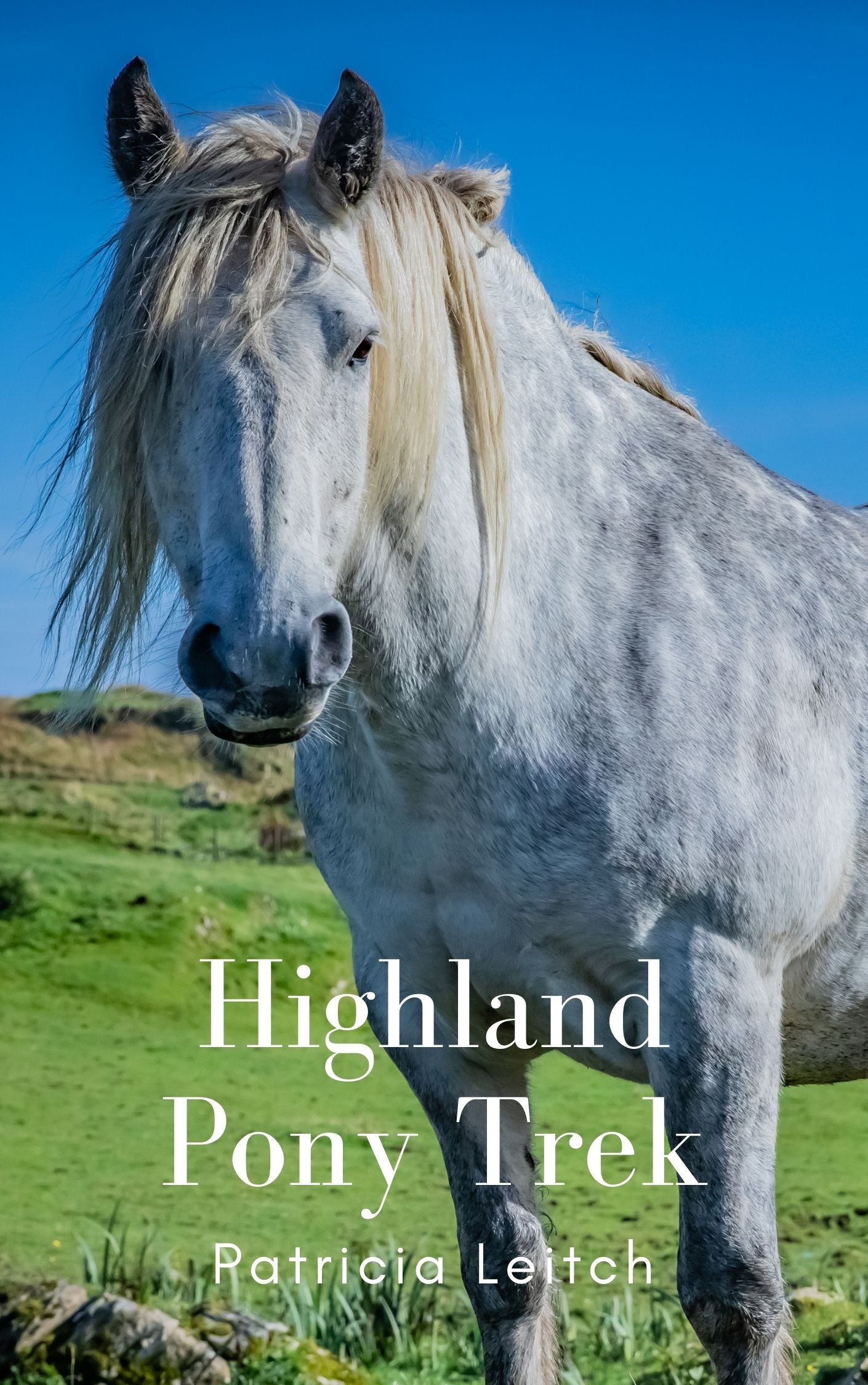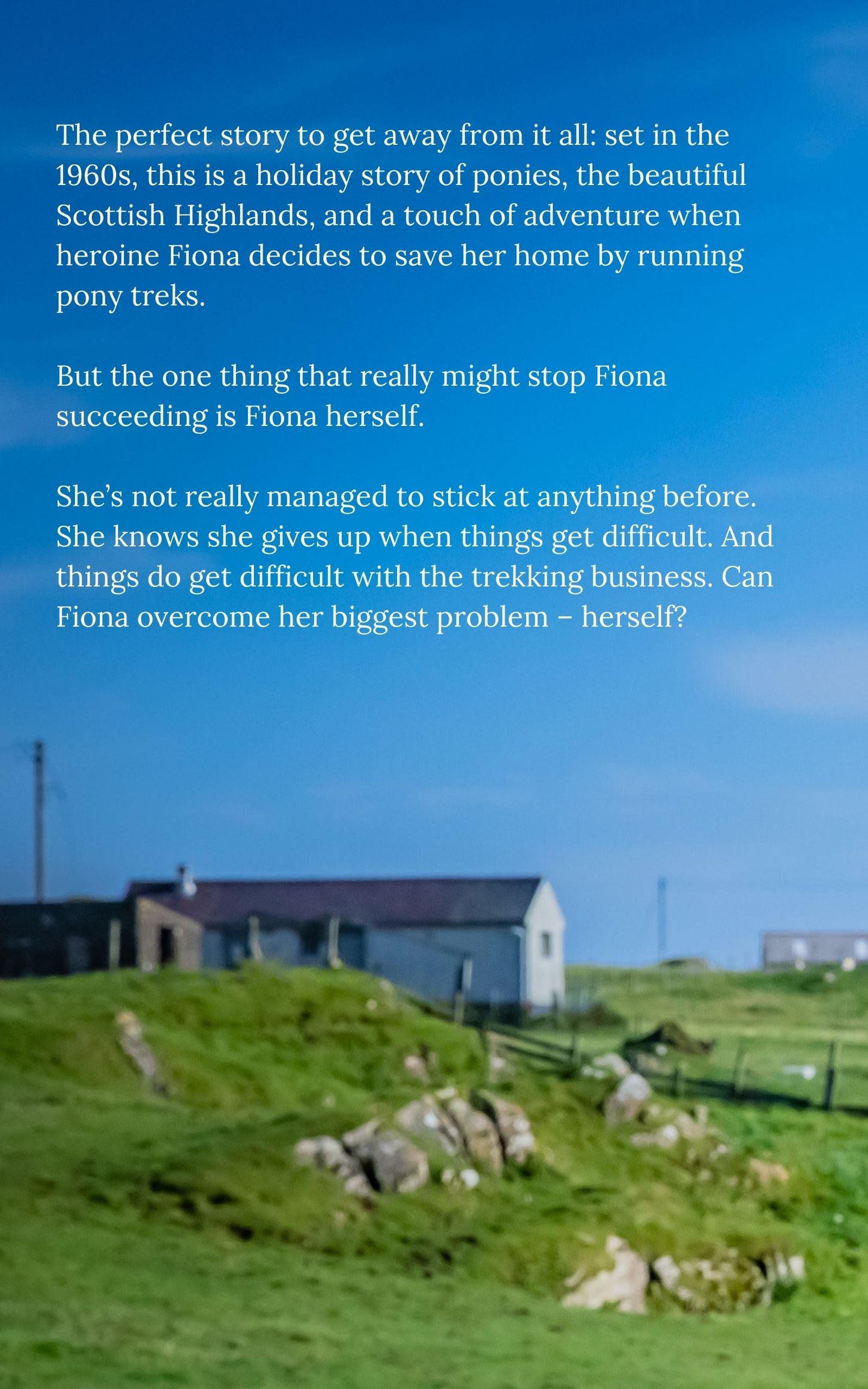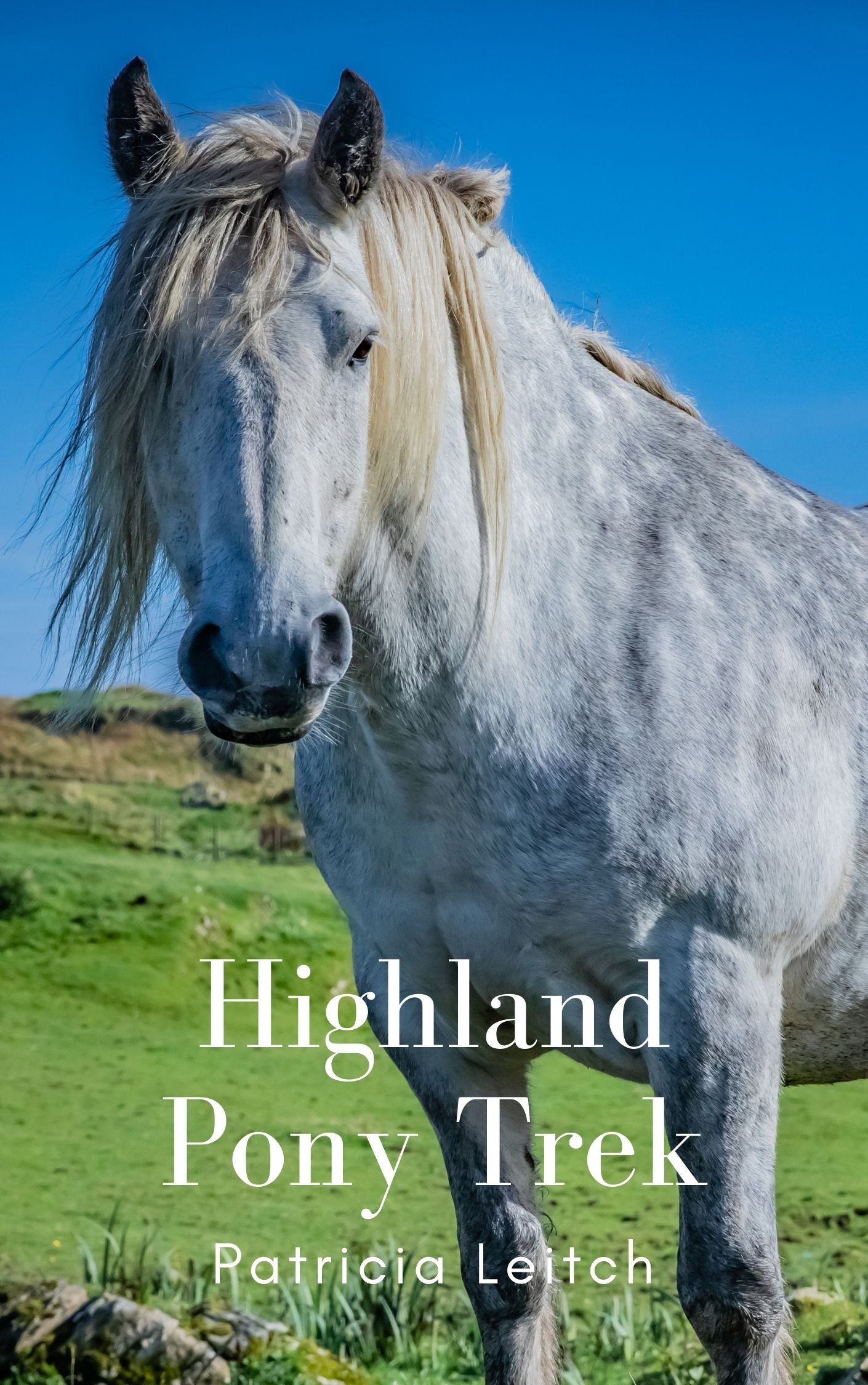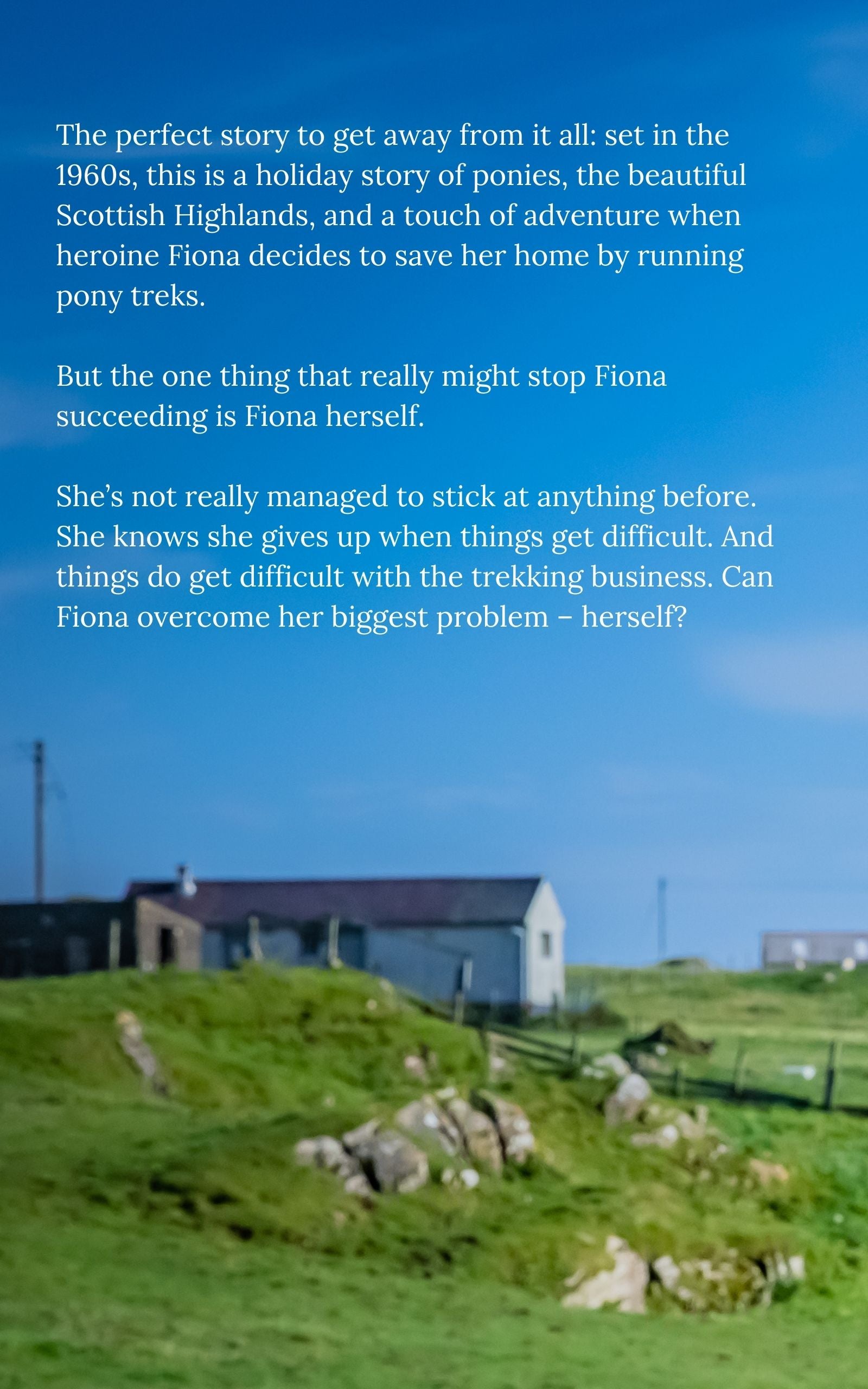Jane Badger Books
Patricia Leitch: Highland Pony Trek (eBook)
Patricia Leitch: Highland Pony Trek (eBook)
Couldn't load pickup availability
Share
This is one of my favourite Patricia Leitch titles, and you can see in it the genesis of the later Gill in Dream of Fair Horses and Jinny in the Jinny books. And there are plenty of Highland ponies, of course, and that never hurts.
How do I get my book?
How do I get my book?
There's a link to download in your confirmation email. If you need help, the email from Bookfunnel, who handle our delivery, will walk you through downloading the file that works best for you.
How do I read my eBook?
How do I read my eBook?
You can read the ebooks on any ereader (Amazon, Kobo, Nook), your tablet, phone, computer, and/or in the free Bookfunnel app.
Read a sample
Read a sample
THE HIGHLAND landscape lay bleak and cold under the searching east wind. It was nearly the end of March but there was no sign of spring. The trees against the chill, grey sky were bare skeletons that moved uneasily to the wind’s force. Only the pines were dark and shadowy with their winter-worn needles and dried cones. The grass showed no new growth. It was still withered and bleached to shades of brown and gold.
The rocky moorland reached down to a wide bay, the landward edges of which were piled high with smooth pebbles carried in by the winter’s storms. Between the pebbles and the sea there was a strip of sandy shingle and then the great rolling surge of the Atlantic.
Two girls cantered along the shingle on their ponies. One was riding a young, black horse of nearly sixteen hands. Although not a pure thoroughbred he was well bred with an arching neck, proud head and fine, clean legs. As he cantered along the sands he tossed his head, fretting against the slight control of the snaffle bridle. Tiny specks of froth flew from his lips to wither into nothing on his sleek, ebony coat. His eyes were wide and glistening, his nostrils drawn back showing their blood-red inner lining, and his ears were sharply pricked above the neat fringe of his mane and forelock.
The pony following behind him was just under fourteen hands. She was a pale, creamy fawn with a dark mane and tail and the black eel stripe, typical of so many Highland ponies, running along her back from withers to tail. In her dense winter coat she was as woolly as a teddy bear. Her bright pony eyes peered through the mass of her thick forelock and her head was level with her knees as she battered along, striving desperately to overtake the black horse who galloped ahead of her with effortless grace.
The two girls were obviously sisters. They both had brown, curling hair cut short all over their heads; hazel-brown eyes under long black lashes; straight, tip-tilted noses; wide, generous mouths that twisted upwards at the corners; square, determined chins and skins tanned brown with being outside in all weathers.
The girl on the black horse was Fiona McKean. She was seventeen, tall and slender. She rode Jester bareback, never moving as her horse shied suddenly at a clump of menacing seaweed.
Morag McKean was fifteen. She was smaller than her sister and as sturdy as Jazz, the Highland pony which she rode. Her short, blunt fingers. tugged without effect on Jazz’s reins, her knees gripped Jazz’s hairy sides as she struggled to stay aboard while her pony galloped madly after Jester.
“If you don’t stop I’ll come off,” she shouted to her sister, but Fiona galloped on.
Jazz had seen Jester shy and when she reached the clump of seaweed she shied in sympathy. Morag sailed off and landed in the midst of the wet, slimy weed.
“I told you I would,” Morag said as Fiona reined Jester in and, turning, came back to inspect her sister’s plight.
“Well, don’t just sit there,” said Fiona sharply. “There’s no point in rolling in the stuff. Your jeans are in a bad enough state without that.”
“If you’d stopped when I asked you to I wouldn’t have come off,” Morag said, struggling to her feet.
“Imagine that now. Born in the saddle and every time we go faster than a walk you’re yelling at me to stop.”
“I am not. It’s all right for you sitting up there on that thing. You came off just as often as anyone when you rode Jazz.”
“Rubbish, I only came off when we jumped her.”
“Stranger to the truth,” retorted her sister.
“Oh, get back on and stop blethering.”
Morag hauled Jazz over to a convenient boulder and tried to remount. It was on the tip of Fiona’s tongue to taunt her sister with her lack of spring when suddenly, like an icy wind on a July day, she remembered that tonight her mother was going to answer the letter.
For a week the letter had lain behind the brass clock on the mantelpiece. It was from a Mr. LeeHoughton offering to buy their home, Invermorden Lodge, and all their land for fifteen thousand pounds. Sandy, the postman, had drawn it from his vast canvas bag and handed it to Jessie Ferguson, their daily help, saying that he didna fancy that one, that it was from the English and had the smooth feel to it. When their mother had opened it Neil, their fourteen year-old brother, Morag and herself had laughed and joked about it, but their mother had said nothing, only putting it back in the envelope and sticking it behind the brass clock where it had lain unanswered but not forgotten.
Then last night Fiona, who had been reading in bed, had gone downstairs for a little something with which to ward off night starvation and had discovered her mother sitting over the dying embers of the fire with the abominable LeeHoughton’s letter in her hand.
“When are you going to answer it?” she had asked her mother. “Tell him just what we think of him. The cheek of the man thinking he could buy our home. As if we’d sell Invermorden. I’ll write to him for you if you like.”
Fiona had cut herself a slice of bread and was just about to butter it when she felt the strained silence in the room and suddenly realised that her mother hadn’t answered her. With a cold clutch of fear she had remembered that her mother had never joked about the letter, had never joined with them in making up insulting replies to the Lee-Houghton.
“I’ll write the letter for you,” Fiona had said again. “I’ll tell him that never in a thousand, million years would we sell Invermorden,” but her voice dried in her throat as she looked across at her mother’s face.
“I don’t think we can afford to refuse his offer. It is easily double what Invermorden is worth.”
Her mother spoke so slowly that Fiona could hardly make sense of the cold, hard words, but at last she realised what her mother had said.
“No!” Fiona had shouted. “No! We’ll never sell Invermorden. Never, I tell you, never. If Daddy were here he would never let you, never, never.”
Four years ago, Mr. McKean had been killed in a car crash. As if it were yesterday Fiona remembered the knock on the door. She had opened it and Donald McDonald, twisting his policeman’s hat in his hands, had asked for her mother. In the kitchen he had twisted his hat more and more rapidly as he struggled for words to tell Mrs. McKean that her husband had been killed outright when a lorry had smashed into the car in which he was a passenger. After the funeral, a lawyer had come from Edinburgh to discuss the future with Mrs. McKean. He had advised selling Invermorden and moving to a smaller house where the upkeep would not be so great. He said that wealthy industrialists were willing to pay fantastic prices for small estates like Invermorden and that now was the time to sell. Mrs. McKean had shaken her head stubbornly and refused to listen to him. They had rented most of their land to neighbouring farmers, Mrs. McKean had advertised for paying guests, and in the summer the lodge was filled with holidaymakers. For the first three summers they were booked out, but last year hadn’t been so busy. There had been several weeks when they had had empty rooms, and in September their only boarders had been three retired teachers, who consumed jugs of coffee and complained bitterly about the weather.
“If Daddy were alive there would be no question of selling Invermorden,” said Mrs. McKean in a tired voice. “Don’t think that I want to sell it any more than you do, but I’ve thought and thought about it and I feel I can’t ignore such a good offer.”
Page length: 150
Original publication date: 1964
Who's in the book?
Who's in the book?
Humans:
Fiona, Morag and Neil McKean, Miss Brothwick, Miss Sim, Nevil, Susie, Iris
Equines:
Jazzy, Jester, Spud, Diamond, Boxer and Pepsi
Other titles published as
Other titles published as
Series order
Series order




